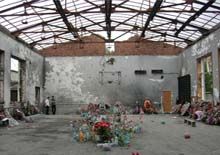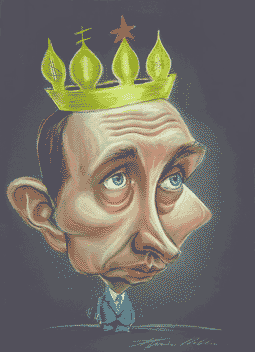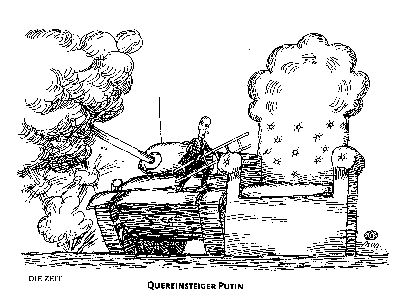Doctor of Disinformation Stuart S. Malawer Misleads Moscow Times Readers on Russia's WTO Rejection
 The Moscow Times yesterday contained an article by George Mason University professor Stuart S. Malawer (pictured, would you buy a used car from this man?) arguing that the United States should not have opposed Russia's admission to the WTO. The article so full of misrepresentaions, half-truths and Russophile screeching that it could easily have been written by a KGB spy seeking to subvert American opposition to rising dicatorship in Russia. Indeed, La Russophobe challenges the reader to explain how a KGB propaganda screed would have been any different (viewed as such, it's actually rather impressive; viewed as an attempt to fairly and accurately report on the WTO process, it's a travesty of truth). One can only wonder why the eminent professor could only find the Moscow Times, as opposed to say the New York Times, willing to publish his little ditty. Wikipedia has never heard of Professor Malawer, nor can La Russophobe find any reference to him on ratemyprofessors.com which rates three quarters of a million instructors (so apparently he doesn't teach much). If you Google him, you get less than 200 hits (La Russophobe herself has more than 20,000). Here is the full article (in black), with running commentary (in red) from La Russophobe pointing out the factual lapses
The Moscow Times yesterday contained an article by George Mason University professor Stuart S. Malawer (pictured, would you buy a used car from this man?) arguing that the United States should not have opposed Russia's admission to the WTO. The article so full of misrepresentaions, half-truths and Russophile screeching that it could easily have been written by a KGB spy seeking to subvert American opposition to rising dicatorship in Russia. Indeed, La Russophobe challenges the reader to explain how a KGB propaganda screed would have been any different (viewed as such, it's actually rather impressive; viewed as an attempt to fairly and accurately report on the WTO process, it's a travesty of truth). One can only wonder why the eminent professor could only find the Moscow Times, as opposed to say the New York Times, willing to publish his little ditty. Wikipedia has never heard of Professor Malawer, nor can La Russophobe find any reference to him on ratemyprofessors.com which rates three quarters of a million instructors (so apparently he doesn't teach much). If you Google him, you get less than 200 hits (La Russophobe herself has more than 20,000). Here is the full article (in black), with running commentary (in red) from La Russophobe pointing out the factual lapses
One important issue from July's G8 summit in St. Petersburg has significant implications for the United States and the global trading system, but received little play in the Western media: Russia's accession to the World Trade Organization. The United States has glaringly politicized this issue for domestic purposes, while its actions in St. Petersburg provided many important lessons for U.S. trade and foreign policy. Little play? La Russophobe just searched "Russia WTO" in the Google News engine and got more than FIVE HUNDRED hits.
The Russian government approached the summit as a major milestone. President Vladimir Putin highlighted his great domestic popularity and Russia's economic revitalization as a result of its oil and gas exports and booming commodity markets. The summit also cast a spotlight on St. Petersburg -- Putin's hometown -- itself. Great domestic popularity? Putin has approval ratings in excess of 70% in a country where the average monthly salary is $300 and the population is dramatically falling, while bloody war is being fought in Chechnya at extravagant cost while being condemned by human rights organizations across the globe. The Polituro had the same kind of popularity, but the USSR wasn't a member of the WTO. When the spotlight shone on Piter, a great number of horrifying defects were revealed. Apparently the good professor doesn't read much, especially not La Russophobe. Like our motto says, you don't really understand Russia unless you do.
Putin wanted the summit to focus on energy security, but in the lead up to the event the U.S. side looked more interested in raising questions involving Russian domestic politics. Ultimately the outbreak of hostilities in Lebanon and Israel hijacked the conference. While this may have obscured the issue of Russia and the WTO, it is still an issue that deserves examination. This is a blatant misrepresentation. What the U.S. was interested in was Russia giving U.S. military secrets to Iraq during the invasion, financial support to Hamas, weapons to Venezuela and nuclear technology to Iran. The bald dishonesty necessary to ignore all these facts indicates that George Mason University shouldn't be at the top of your list of places to send your impressionable younguns.
Russia is the world's largest economy not within the WTO. Its application for membership has been pending for more than a decade. During this period, countries such as Saudi Arabia, China, Armenia and Croatia have become members and Vietnam is expected to join this year. Russia possesses the second largest oil reserves in the world and many of its corporations (state-owned natural gas monopoly Gazprom, for example) are now involved in global transactions, mergers and acquisitions. Some of the largest IPO's in the world this year have involved Russian companies, such as Rosneft. None of the countries listed have proud KGB spies as their presidents, do they? Are any of them giving nuclear technology to America's arch foe Iran? Not really. Apparently, the good professor thinks it would be a fine idea for America to sell its soul for oil, but his obvious hatred of the Bush administration makes it unlikely he supported the Iraq war for that reason. If he read even a little, he'd know that Russia's oil IPOs have been ridiculed by financial experts across the globe. Or maybe he does read, he just lies about it afterwards.
Russia is clearly in a state of economic and diplomatic ascendancy after the disastrous 1990s. The RTS stock index has been reaching new heights, foreign currency reserves are the third-highest in the world and the economy is growing at an annual clip of 6 percent. Announcements of plans for new foreign direct investment have accelerated. As reported on La Russophobe and elsewhere, the bottom dropped out of the Russian market at the beginning of the summer, and within a few weeks the market had lost 1/3 of its value. The professor doesn't care to menton that, does he? In fact, Russia has had a whole spate of economic disasters culminating with the recent news that personal incomes fell by 5%. The professor seems not to understand what even Maryanne and Ginger know, which is that because the base of the Russian economy is so tiny, 6% growth in Russia produces nothing remotely like the value it would in a first world economy like Japan's or Germany's, which can have a far lower rate of growth and produce far more value. Notice how the good professor doesn't care to mention Russia's $300 per month average incomes?
WTO accession agreements have been concluded between Russia and all of the WTO member states except the United States. This agreement is required before Russia can join the WTO. Another outright misrepresentation. As La Russophobe has noted, Kommersant reported weeks ago that Russia does not have agreements with Moldova, Costa Rica or Georgia.
On the eve of the summit, the Russian delegation announced a trade breakthrough with the United States. Finance Minister Alexei Kudrin was quoted by Russian media as saying the accession protocol would be signed at the beginning of the summit. But what seemed like a sure thing quickly dissolved. The United States immediately declared that some unresolved issues remained, primarily involving market access and lingering concerns over intellectual property rights. At this point the Russians belatedly raised the minor issue of meat imports from the United States. The Russian delegation demanded the right to inspect U.S. farms in order to protect against mad cow disease (there have been two cases reported in the United States). It was clearly a face-saving measure. This is blatant misrepresentation. There is no evidence of any kind that Kudrin was ever told by any member of the U.S. team that Russia's WTO proposals would be accepted. As La Russophobe has reported, in late June Senate Finance Committee Chairman Charles Grassley, one of the most senior an influential of American legislators, said there would be no WTO deal for Russia in Piter. By ignoring these basic facts, professor Malawer exposes himself as the most base and disgusting of partisan shils.
The G8 states then mumbled something about resuscitating the moribund Doha Round and the United States and Russia said they hoped to move forward on Russian accession in the fall. (WTO chief Pascal Lamy subsequently declared a suspension of the Doha Round negotiations.) U.S. President George W. Bush indicated at the summit that more concessions would be required to get congressional approval. Just prior to the summit, Senate Democrats had urged Bush not to enter into an agreement. They had doubts about Russia's reliability as a trading partner and its willingness to comply with WTO obligations. The U.S. Chamber of Commerce also raised its long-standing concerns over corruption and the defense of intellectual property rights in Russia. Senator Grassley is a ranking Republican, not a Democrat. So members of Congress on both sides of the aisle AND the Chamber of Commerce opposed the measure, yet the Professor thinks President Bush should have run roughshod over all of them. Sounds like something Putin or Stalin might suggest.
Partly as a result of this stalemate, several major transactions involving U.S. and Russian firms remain stalled, including Boeing's effort to sell aircraft to Aeroflot and Chevron and ConocoPhillips' proposal to partner with Gazprom partners in the Barents Sea gas project. The St. Petersburg Times reported on August 15th that "with President Vladimir Putin’s blessing, Boeing struck an $18 billion deal Friday with VSMPO-Avisma to supply titanium for its airplanes."
The situation clearly demonstrates that trade has become a secondary policy objective for the United States. Susan Schwab, the newly installed U.S. trade representative, and her leadership team are simply not senior or experienced enough to create new political realities. The default inclination of anti-Russian and protectionist forces within Congress and the Bush administration are surfacing, as they often do, at exactly the worst moment. The United States needs a strong global economy, a viable multilateral trade organization and a partner on a host of diplomatic and national security issues, including Iraq, Iran, North Korea, Afghanistan, global terrorism, secure energy supplies and global economic development. So, what the good professor is saying is that no matter what the Chamber of Commerce or the U.S. Congress wants, Ms. Schwab should be able to ram a WTO agreement right down their throats, and if she can't that can only mean she's "not senior or experienced enough" (code for incompetent). In other words, if you don't agree with the professor, you're a fool.
The breakdown of the Russia-U.S. accession discussions speaks volumes. Russia thought it had an agreement, so much so that it made the announcement. The agreement would have been the crowning achievement of the G8 summit for all of the members. But the United States refused to allow this to happen, for the same old reasons: congressional pressure, business lobbying and, most importantly, presidential administration officials who still just don't get it. Yeah, that darned old democracy sure is a downer. No wonder the professor is so fond of Putin.
By standing in the way, administration officials demonstrated that they did not understand the folly of pressuring a country that spans 11 time zones into adopting domestic policies stemming from U.S. political and cultural ideological perspectives developed during the United States' own unique political history. Russia has its own political and cultural history spanning 1,000 years. Yes, corruption is a problem. But that is true in many other countries. There is significant pressure in Russia already to sign the UN Convention Against Corruption. Is corruption in Russia any more of a problem than in a large number of other countries? Clearly, many in Congress and the Bush administration still view Russia through a latent Cold War prism. Well, the professor is at it again. More boldfaced, propagandistic distortions. As La Russophobe has already reported, this year's Corruption Index by the German think tank Transparency International says that Russia is tied for the 9th most corrupt nation in the world. Russia has the same level of economic corruption as Niger and Sierra Leone, and neither of those countries has ICBMs or is governed by a proud KGB spy who spent his life thinking of ways to destroy the United States. It's simply intellectual fraud of the first order to ignore these basic facts (unless of course the good doctor didn't even know about them, which would rather decisively disqualify him on competence grounds).
The integration of Russia into the global economy is essential. The WTO is the only major multilateral organization that really works. Its goal is the creation of a rule-based trading system and its dispute-resolution system is extraordinarily effective. Global trade has expanded exponentially since the organization's founding in 1995. The underlying premise of the WTO is that, as a rule-based system developed to govern global trade, it will help foster rules and institutions within the civil society of member states, making them more democratic and wed to the free market. This system is the critical link between global trade, economic prosperity and political development -- as envisioned by the United States as the architects of the WTO. How can Russia be part of a rule-based trading system when it has the world's ninth-most-corrupt economy? Why shouldn't the U.S. oppose the admission of a country whichis providing military assistance to America's most hardened enemies, like Venezuela and Iran?
The goal of Russian accession should not be sacrificed on the altar of atavistic perceptions. The United States should modify its trade and foreign policy. It must develop a comprehensive national security policy, integrating global trade and foreign policy concerns without domestic political intrusions, to enhance trade relations and to give political development a boost -- both in Russia and around the globe. "Sacrificed on the alter of atavistic perceptions." Wow. What seething hatred the professor has for anyone who disagrees with him. Apparently, if you do, you're a savage who needs to be broken or euthanized.
Stuart S. Malawer is a professor of law and international trade at the George Mason University School of Public Policy.


























